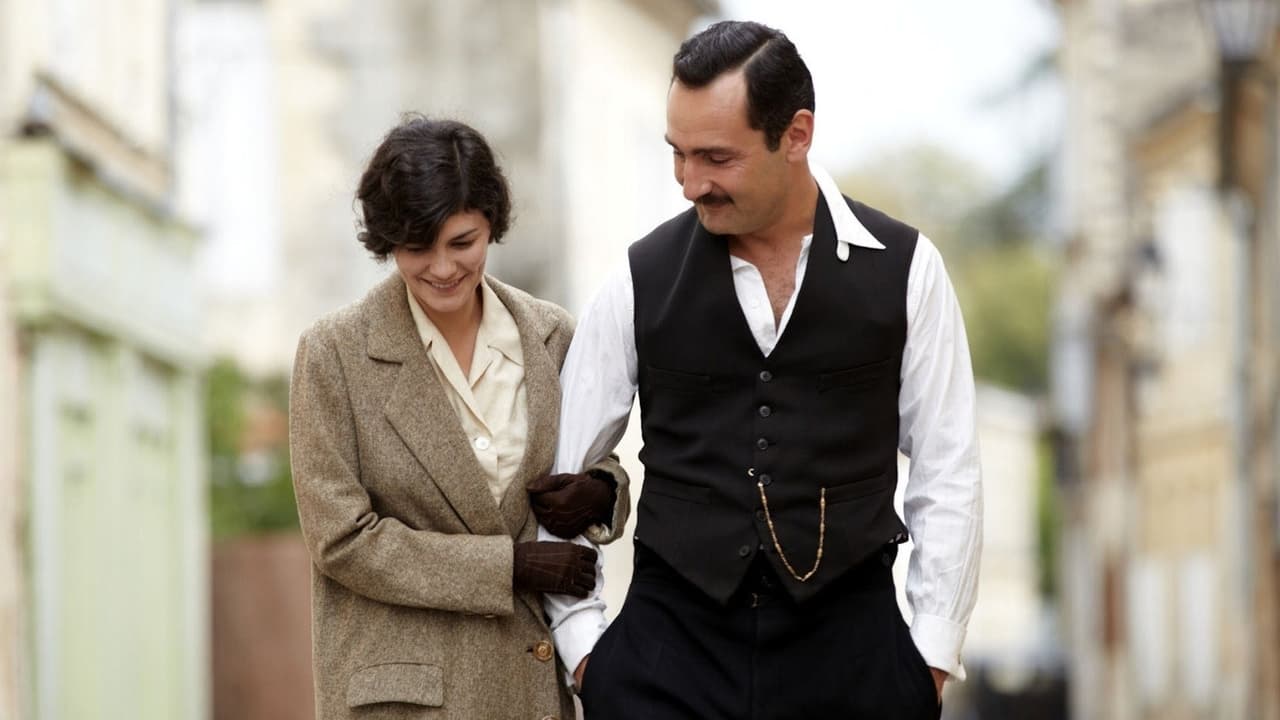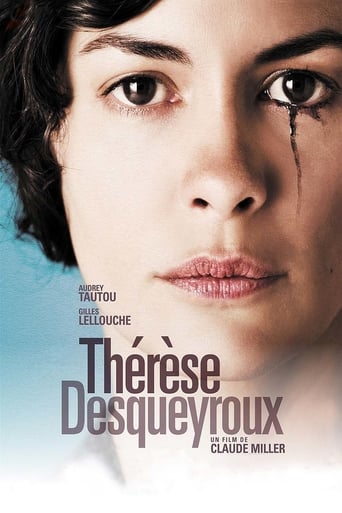

Catching up on what is happening in the UK General Election,I started to talk to friends on Twitter about their views on events. During the chats,a friend told me that the BBC were about to show a Audrey Tautou that he has been interested in seeing for ages. Charmed by Tautou in He Loves Me... He Loves Me Not,I got set to meet Thérèse Desqueyroux.The plot:Living life as a free spirit in late 1920's France, Thérèse Laroque begins moving away from her open nature,to instead keep with tradition and get together with Bernard Desqueyroux for a marriage of convenience. Originally hoping that the marriage would clear a path that would allow the life goals to be seen, Thérèse finds herself stuck in a loveless marriage,which burns Thérèse's life away.View on the film:Creating a final work whilst dying from cancer,co-writer (with Natalie Carter) director Claude Miller & cinematographer Gérard de Battista give the Costume Drama a funeral atmosphere,lit in dour yellow lights that beam on the stark face of Desqueyroux. Sketching the misery of Desqueyroux's life,Miller digs into the period with elegant charcoal browns and blacks covering any light coming into Desqueyroux. Removing her distinctive kooky smile, Audrey Tautou gives a marvellous performance as Desqueyroux,with Tautou pulling Miller's Desqueyroux down to a burning ember.
... View MoreThere are strong echoes of Madame Bovary and Anna Karenina in Claude Miller's film 'Therese Desqueyroux', derived from a 1920s novel about a woman trapped by convention in a stultifying marriage to a mediocre man. But where Emma Bovary is stupid, Therese is deeply intelligent; whereas Emma has an affair, Therese merely learns of that of her sister in law; and whereas Emma kills herself, Therese tries to murder her husband. In modern parlance, Therese is medically depressed; but while depression may lead to irrational behaviour, it is not itself necessarily without cause. In all these stories, one can feel ambiguous sympathy for the entitled husbands, who may not be likable per se, but who don't fully deserve the hand that fate deals them. There's a nice scene at the end of this film which neatly summarises Monsiuer Desqueyroux's utter emotional constipation. I also liked the way that the time and place (the Landes forest in south west France) are portrayed, and Audtey Tatou is very good in a role which is the opposite of cute.
... View MoreContains spoilers! Well this is a very odd little movie, and one that has a lot of similarities to another movie I saw (and reviewed) recently, the "Kate Winslet" version of "Mildred Pierce". Both movies are based on novels of no great distinction that should have otherwise been relegated to the pulping machines. Inexplicably this is the second film version to be made of both novels. Since both novels are now quite old the latest movie renditions are now period pieces, and that seems to be the only possible interest to a viewer and rationale for making a film which if not deep is at least "beautiful". Both movies feature woman protagonists of low/no charisma, yet both are played by actresses of considerable talent and acclaim. Both actresses are called upon to display absolutely none of the skills for which they are noted, producing what is probably the nadir in both actresses portfolios.The movie opens with a breathless and hopelessly overacted sequence involving two young girls, and we gather there is a special bond between them, possibly to the extent of lesbianism. For reasons which are unclear one of them not only shoots a bird but considers it necessary to also wring its neck. This scene is apparently significant because it is reprised later in the movie. The dialog implies that it is intended that one girl's sister will in the not too distant future marry the other girl. We then abruptly cut to this predicted courtship but, at least to my surprise, the "girl" now looks about 40 and the brother/fiancé looks about 50. In the intervening 20 years since the introductory sequence the girl seems to have morphed from a flighty, babbling youth to a middle age woman with all the warmth and passion of a sack of spuds. The girl/woman and the brother duly marry not out of love but out of duty to their families and their mutual business interests, and the marriage is consummated with the girl acting like the afore-mentioned sack of spuds. Meanwhile the husband's sister has found the real deal, or so she thinks, she has fallen head over heels in love with a guy who sails a nice boat but who unfortunately does not pass muster in the social stakes. The sister's family lock her away in the time honored tradition of discouraging unsuitable suitors, and her old friend (her brother's wife – are you following all this...?) is called upon to encourage her lover to desist from the relationship. As it happens the "lover" is just a big scumbag who doesn't care about the girl at all. He is a "free spirit", a liberal, an avantgarde who quotes poetry and philosophy, the world is his oyster, he was just having a bit of fun and no one is going to tie him down, he is off to Paris. All this talk of freedom ignites a little spark in the brother's unfulfilled wife and she goes off into a little fantasy world which seems to suggest that she might shack up with this neer do well. But all this comes to nothing, that little thread peters out and goes nowhere. The wife has a baby she doesn't like, she tries to poison her husband and she may or may not have had a hand in burning down a good part of their combined pine plantation. She moons about a lot not looking very happy and she doesn't seem to know what she wants. Eventually her long suffering husband agrees to let her go to Paris to start a new life. In the final scene she still doesn't know what she wants, she doesn't know why she tried to poison her husband, in fact she doesn't really know anything. She is really a complete waste of space.Was there a message here? Was this novel/movie supposed to be some sort of comment on the role of women and their suppression by men and society? Was it supposed to be a celebration of liberation? A triumph of passion over societal expectations? Should we care about this woman, someone of zero passion, drive or warmth, or about her not very likable husband? What happened to the only interesting character in the story, the husband's sister? Or to her baby? Why were so many story threads started only to be abandoned? Why did they take a talented and attractive actress like Audry Tatou and made her look so ugly, boring and stupid? All these questions and more.All in all, much ado about nothing.
... View MoreClearly Audrey Tautao has now acquired sufficient clout to cherry pick her roles and equally clearly she is weary of playing adorable air-heads and, looking around for something with which to display her acting chops, came up with Francois Mauriac's old war-horse of a novel from 1927, already filmed half a century ago by Georges Franju. Claude Miller was a sick man - he actually died shortly after the shoot - and arguably in no position to say nay so here we are. No one is going to accuse this of being a laff riot in fact Tautao cracks a smile only on one - or possibly two - occasions otherwise it's all very sombre, long takes, longer faces, an attempt to make boredom photogenic, for yes, Therese and Madame Bovary are sisters under the skin albeit Therese has a tad more sand, and has also a little in common with Madeleine Smith, late of Edinburgh. Gilles Lellouche turns in yet another fine performance and the movie tests high on atmosphere but I doubt it will find its audience.
... View More